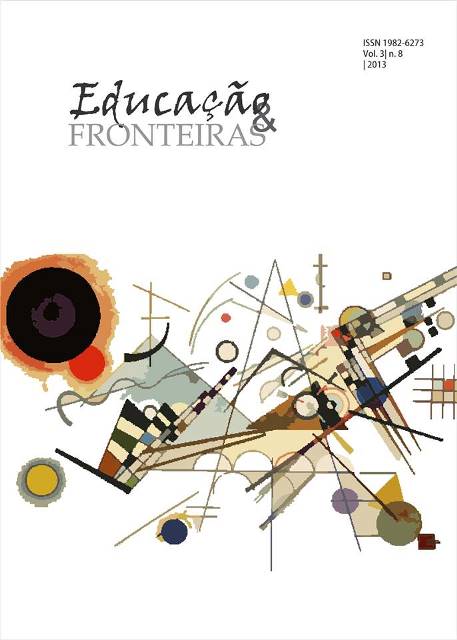Knowledge and pedagogical practices that influence the construction of the identity of the virtual teacher
Keywords:
Identity. Distance Education (EaD). Virtual teacher.Abstract
The text screen displays and discusses education teacher who teaches in virtual spaces. Such discussions we list the knowledge and pedagogical practices inherent to the specificities of these spaces and influence the construction of teacher identity. The text draws upon, centrally, the issues reflected by Stuart Hall (2006), about the new identities arising from social diversity and leaving the fragmented modern individual. These issues are discussed in the context of digital EaD, and teacher training in their subject. It is known that the teacher of the XXI century and, essentially, the virtual teacher, falls within a multicultural society, criticism, permanently changing. In this sense, the different looks and their convergence, considering the virtual classroom, incorporating various media, multiple languages and communications that require teacher acquisition of other knowledge, other pedagogical practices that go beyond coping with the opinion of others, but where acknowledge and accept the issue of other, often in real time from the computer mediated interaction.Downloads
References
ALTHUSSER, L. Aparelhos ideológicos de Estado. Rio de Janeiro: Graal,
BLOOM, B. S. What we are learning about teaching and learning: a
summary of recent research. Principal, v. 66, n. 2, p. 6-10, 1986.
BOURDIEU, P. e PASSERON, JC. A reprodução. Rio de Janeiro:
Francisco Alves, 1975.
BRASIL. Decreto nº 5.622, de 19 de Dezembro de 2005. Disponível em:
http://www.planalto.gov.br/ccivil_03/_Ato2004-2006/2005/decreto/D5622.htm Acesso em: 02 jun. 2012.
BRASIL. Lei Nº 9.394, de 20 de Dezembro de 1996. Disponível em:
http://www.planalto.gov.br/ccivil_03/leis/l9394.htm Acesso em: 02 jun.
BRZEZINSKI, Z. La era tecnotrónica. Buenos Aires: Sudamericana, 1972.
CAMPOS, Dinah Martins de Souza. Psicologia da aprendizagem. 31 ed.
Petrópolis: Vozes, 2001.
CENSO EaD: Relatório Analítico da Aprendizagem a Distância no Brasil
São Paulo: Pearson Education do Brasil, 2012. Disponível em:
http://www.abed.org.br/censoead/CensoEaDbr0809_portugues.pdf
Acesso em: 27 mai. 2012.
DUAYER, Mário. Ontologia na ciência econômica: realismo ou ceticismo
instrumental? Niterói: UFF, 2003.
FERRAZ, Ana Paula do Carmo Marcheti e BELHOT, Renato Vairo.
Taxonomia de Bloom: revisão teórica e apresentação das adequações do
instrumento para definição de objetivos instrucionais. Gest. Prod., São
Carlos, v. 17, n. 2, p. 421-431, 2010. Disponível em:
http://www.scielo.br/pdf/gp/v17n2/a15v17n2.pdf Acesso em: 05 jun.
HALL, Stuart. A identidade cultural na pós-modernidade. Rio de Janeiro:
DP&A, 2006.
MARTÍN-BARBERO, Jesús. Ofício de cartógrafo: travessias latinoamericanas da comunicação na cultura. São Paulo: Edições Loyola, 2004.
MORAES, Maria Célia Marcondes de. Recuo da teoria: dilemas da pesquisa
em educação. Revista Portuguesa. Braga: Portugal, nº 14, 2001. Disponível em: http://redalyc.uaemex.mx/src/inicio/ArtPdfRed.jsp?iCve=37414102 Acesso em: 20 mai. 2012.
MORAES, Maria Célia Marcondes de e MÜLLER, Ricardo Gaspar.
História e experiência: contribuições de E. P. Thompson à pesquisa em
educação. Perspectiva, Florianópolis, v. 21, n. 02, p. 329-349, jul./dez.
PRIMO, Alex. Interação mediada por computador: comunicação,
cibercultura, cognição. Porto Alegre: Sulina, 2007.
SANTOS, Geandra Cláudia Silva. Formação de professores como produção
subjetiva: propondo reflexões e diálogos. In: LIMA, Isaías Batista de (org.). Didática, Educação Ambiental e Ensino de Ciências e Matemática:
Múltiplos olhares. Fortaleza: EdUECE, 2013.
SCHAFF, Adam. A sociedade informática. São Paulo: Brasiliense, Unesp,
SILVA, Tomaz Tadeu da. Teorias do currículo: uma introdução crítica.
Porto: Porto Editora, 2000.
TARDIF, Maurice. Saberes docentes e formação profissional. Petrópolis:
Vozes, 2007.
TARDIF, Maurice. & LESSARD, Claude (org.). O ofício de professor:
história, perspectivas e desafios internacionais. Petrópolis: Vozes, 2008.
TYLER, Ralph W. Princípios básicos de currículo e ensino. Porto Alegre:
Globo, 1974.









